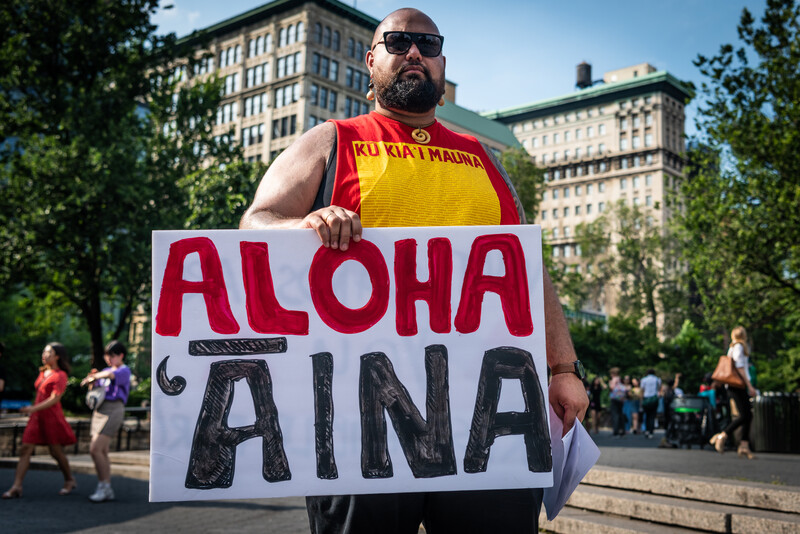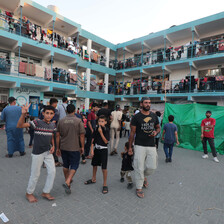The Electronic Intifada 18 December 2019

Palestinians and Kanaka Maoli both believe in love of the land.
SIPADuring my recent trip to Hawaiʻi, I found many similarities between its native people – Kanaka Maoli – and Palestinians.
Both of us share the concept of Aloha ʻĀina, which is translated as “love for the land.”
Kanaka Maoli have great respect for all the natural elements, while many continue to revere the deities associated with them. They work hard to protect the environment.
The earth mother is a Kanaka Maoli deity. The land is, therefore, replete with spiritual significance; it is a provider of nutrition and life.
It is not a commodity to be bought and sold.
Like Palestinians, Kanaka Maoli describe farmers as “salt of the earth.”
And, like Palestinians, Kanaka Maoli are also struggling to survive on their land.
I had an opportunity to visit the protectors – or kia’ʻi – of Mauna Kea, a Hawaiian mountain regarded as sacred by many indigenous people. There, hundreds of Kanaka Maoli – along with their non-indigenous allies – are taking part in a blockade aimed at stopping the Thirty Meter Telescope project.
Desecration
As its title suggests, the $1.6 billion scheme involves the building of a massive space observation center. The opponents of this project regard it as an act of desecration in an ancient burial ground.
When I went to see participants in the blockade, I was reminded of how a Palestinian woman hugged an olive tree during the second intifada – to try and stop Israel from destroying it.
There is arguably more awareness in Hawaiʻi about indigenous struggles taking place around the world than in any other US state.
The Palestinian flag flies next to flags of other indigenous peoples in the camp erected by the kia’ʻi at the base of Mauna Kea. Its presence is a clear expression of solidarity toward Palestine from Kanaka Maoli.
A delegation from the Palestinian Youth Movement visited Hawaiʻi last month. Some Kanaka Maoli accepted an invitation to come to Palestine so they can witness our plight firsthand.
The indigenous Hawaiians with whom I spoke had a strong sense of humor.
One Kanaka Maoli man who visited Palestine told me that he showed the movie Born in Gaza to a comrade of his, who had voiced anger at state policy towards Hawaiians. This prompted his comrade to “stop complaining,” the man said.
When I met Kanaka Maoli, I saw them as Palestinians.
I saw them as Palestinians standing up to prevent the demolition of their homes in occupied Jerusalem.
I saw them as Gaza’s people continuing to participate in the Great March of Return despite all the deaths and injuries inflicted by Israel.
Drawing strength from each other
Palestine and Hawaiʻi have similar histories.
In the 18th century, Daher al-Umar founded what has been described as “an autonomous Arab homeland in Palestine.”
Toward the end of that century, steps were taken toward unifying the Hawaiian Islands. That led to the establishment of a Hawaiian kingdom.
In the cases of both Palestinians and Kanaka Maoli, efforts to achieve independence have been thwarted by colonization.
The Hawaiian Islands were annexed by the US government in 1898. The annexation was illegal under international law.
Though still part of the Ottoman Empire, Palestine was effectively promised to the Zionist movement by Arthur James Balfour, Britain’s foreign secretary at the time, in 1917. Britain took over the administration of Palestine following World War I.
Britain’s brutality toward Palestinians – including the suppression of revolts – enabled the ethnic cleansing carried out by Zionist forces in the 1940s. That ethnic cleansing – known to Palestinians as the Nakba or catastrophe – resulted in Israel’s establishment.
Israel oppresses Palestinians every day, but we have not given up our struggle.
There are clear parallels between our steadfastness and that of Kanaka Maoli.
If there is one lesson that can be learned from both Hawaiʻi and Palestine, it is that it is possible to challenge colonization through unarmed resistance.
The protest at the base of Mauna Kea is still going strong – more than five months after it began.
This effort can be compared to the popular resistance against Israel’s settlement activities and the construction of its apartheid wall in the West Bank. And it can be compared to how the Great March of Return has put the spotlight on how Israel has kept Gaza under siege for more than a decade.
International solidarity is even more vital for indigenous peoples. We must stand together and draw strength from each other.
That is how we demonstrate our shared love of the land.
Yousef M. Aljamal is a writer from Gaza. Twitter: @YousefAljamal.
Editor’s note: Some changes have been made to this article following publication. A reference to the imprisonment of an indigenous Hawaiian queen has been removed.





Comments
Hawaiians are like Palestinians
Permalink carol replied on
While I totally agree that native hawaiians suffer discrimination and condemn the annexation of the kingdom in a bloodless coup, the Palestinians suffer to a much greater decree in every way, even to the extent that Gaza is used as a proving ground for the zionist arms manufacturers who then claim that their weapons have been 'proven' in combat. (What 'combat' anyway?)
Hawaiians are not kept from marrying any others of different races or ethnic backgrounds; they are not kept from continuing their education; there is a well-endowed school which admitted children of hawaiian 'mixed race' where the language is part of the curriculum. Holidays include aspects of the old culture (of interest and pageantry for tourists, of course) as well as birthdates of the old aristocracy…
The fate of the hawaiians today and their respect for their beliefs is sad, but cannot be greatly likened to that of the brave Palestinians who suffer every kind of discrimination, punishment and abuse that one group of violent aggressors can imagine against hapless victims. Unfortunately, the treatment received is not different from that meted out in the 1930's to political prisoners, gypsies, the mentally and physically handicapped, and others in Germany.
But yes, I agree that Palestine's flag should be flown everywhere in Hawaii…as in Cuba, Venezuela, Bolivia, Ecuador, hong kong, Mexico, britain, u.s.a……..everywhere. And I support the building of the telescope because that is where scientists from all over the world have a chance to meet and work together.
Solidarity
Permalink Frank Dallas replied on
Degrees of oppression may be important, but not as important as solidarity in defence of justice and democracy. The people of Palestine and of Hawaii need world wide support from the minority who recognise that justice is indivisible. We are a minority. The rich and powerful across the globe control the culture which forms the public mind. Look at the argument in the UK about the potential abolition of the BBC. Far from beyond criticism, the BBC is limited by charter. It is required to fulfil a remit: to inform, educate, entertain. Crucially, it isn't run to make a profit, isn't beholden to shareholders, isn't in the hands of corporate wealth. It could do to be democratised, but the suggestion of its abolition is politically motivated. The intention is a thoroughly commercialised media so that those who deliver them are committed to the business ethos and inimical to any criticism of it. Would Radio 3 survive? Probably not. Why is that important? Because it raises the general level of musical appreciation and knowledge. How does that relate to justice for Palestine or Hawaii? Driving down the general cultural level (dumbing down as it used to be called)is the best way to ensure a low level of awareness of issues like the oppression of the Palestinians. We are a minority because the rich and powerful deliberately organise the world to ensure we are, but it is vital that we are a minority which makes itself heard and whose resolve stiffens with every attempt to silence us. The Palestinians and the Hawaiians can no more win their struggle alone than could the oppressed of South Africa. Across the world we must ensure their case is heard. Minorities become majorities in the long run and through great effort.